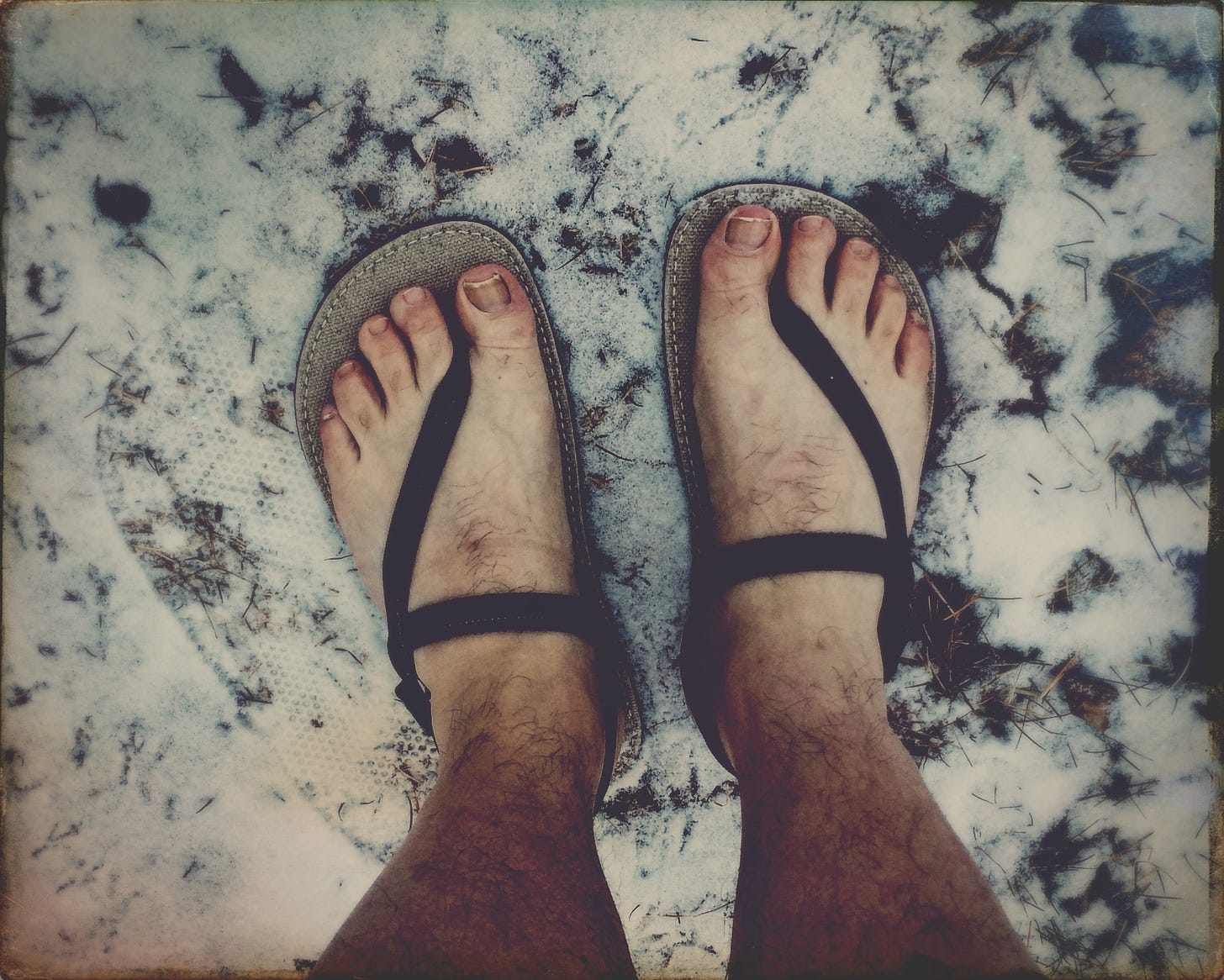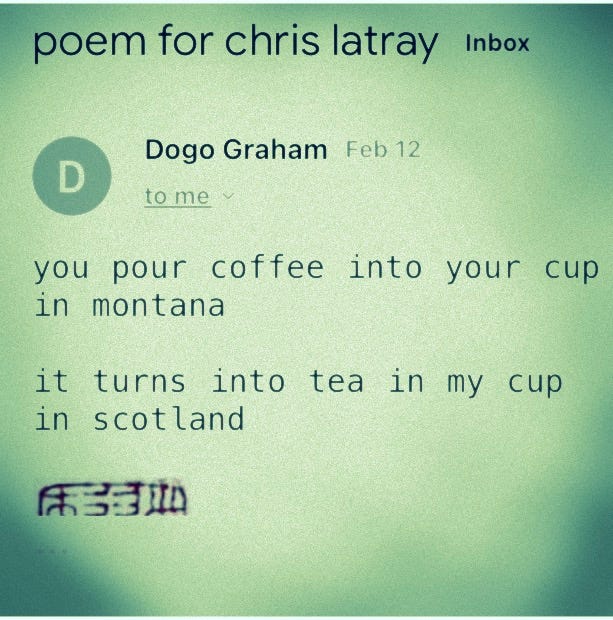Boozhoo, friends! Welcome to the midweek(ish) version of An Irritable Métis. This is where things are usually a little more random, a little less … irritable. If you forgot what all this is even about, you may remind yourself here. If you want to help keep a writer out of hard labor, well….
We had a brief flirtation with spring-like weather here in the Hub of Five Valleys last week, with temperatures nosing up into the 50s. That is odd for February … if not all that unusual, really. Things will be back to normal in a few days when subzero weather returns, so all the folks bleating, “It’s too early for spring!” out into the void don’t need to get overly caught up on the imminence of Sandal Season. I’m still here for misty gray mornings with everything coated in hoarfrost. I’m not yet tired of winter, even if I am hearing more and more trills from red-wing blackbirds….
🤯 What?! 🤯
Land acknowledgements remain something I generally despise. I make this point whenever they come up, that to me they are the Good Liberal’s version of “thoughts and prayers” because they are typically intoned with a degree of solemnity that doesn’t make the the transition to any action being taken. Last night I had the idea of what they can mean turned upside-down and now I am rethinking my entire approach to them.
Here’s how it happened. I logged into a zoom event via Banyen Books in Vancouver, B.C., to watch a conversation with Zenju Earthlyn Manuel in discussion of her new book, The Shamanic Bones of Zen. I haven’t read this book — it only just arrived in my mailbox yesterday — but I have read some of her other work. I particularly loved the book, The Deepest Peace: Contemplations from a Season of Stillness. It’s wonderful. I think she is wonderful.
Anyway, the event opened with land acknowledgements. I endured; at least Canada has made it an official “thing” but I also know they are already decades behind in their truth and reconciliation promises toward their First Nation people so I remain a little irritated when I hear them. But Zenju, in a brief discussion of the practice, said something along the lines of how they are a way to invite our ancestors into the room. I sat up straight in consideration of that. What an idea!
Imagine if land acknowledgements were more than a brief paragraph someone googled ten minutes before the event, or established months earlier and then never thought about them again, and were instead a call to action, if only in that moment, in that space where they are being invoked. What if the standard became something akin to a prayer that recognized the land, and then somehow invoked the ancestors of all the people attending as well as the ancestors still lingering with the land, that we might come together generationally and spiritually in that room to heal ourselves on what is a terribly bloody landscape soaked in the sorrows of what has been done to so many people? What if every event began with a moment of silence, a moment of reflection, in the spirit of this kind of reconciliation? Would it be more likely to plant a seed in the hearts of people who might otherwise ignore the moment? It might be a start.
Rituals
Another thing Zenju talked about is our lack of ritual anymore. Our lack of rites to deal with the seriousness of what is happening in the world around us. The conversation was in reference to the recent beautiful funeral and public cremation of Thich Nhat Hanh, the length of time people would be mourning for him, all of it. That how in our culture we might take an afternoon off for an hour’s funeral of a loved one and then that is that. What a tragedy that is. It makes me think of my grandmother, who died roughly a month before my father, and of my father. There was no official mourning for either of these people who were so important to my life and I remain troubled by it.
And what of the nearly one million people who have died in this country because of COVID? Instead of figuring out a way to just shut everything down for a few days, even just a single day, to more collectively recognize this nightmare of misery we are all enduring, we are instead still fighting over how it’s all just not a big deal and we have to get back to some idea of normal. What a gigantic, soulless mistake we are making. If we don’t figure out a way to ritualize this catastrophe, we will bear that burden of sorrow in unhealthy ways for generations. What if we set a date, what if we all just … stopped … for a day? What if we gathered? What if we dared to mourn publicly?
The Great Mystery
I’m currently reading The Manitous: The Spiritual World Of The Ojibway by Basil Johnston. I love this excerpt:
“But the Earth did much more than serve and fulfill humans' and animals' physical needs and appetites. Through all its stages and seasons, Mother Earth inspired and evoked in men and women a sense and appreciation of beauty, curiosity, and wonder and stirred in their souls joy and sometimes gloom. Old men and women often paused to gaze on the sun rising on the horizon as if from the depths of the sea in the morning or to watch it decline in the west in a shroud of crimson to gratify their sense and need for beauty, saying in wonder, ‘Only Kitchi Manitou can do that.’ In their travels over their lands, the Anishinaubae people saw many spectacles, such as a rainbow at the foot of a waterfall or the dance of thousands of wavelets in a moonlit lake, that entranced them and made them long for time to stand still and make the vision last forever. Mother Earth was beautiful beyond words, for all time.”
I carry this appreciation in my Anishinaubae soul. It is why I can never be an Atheist. I live embraced by a spiritual world where Creation is something of a mystery. And that is who Kitchi Manitou is, the Great Mystery. I don’t need to know any more than that. I’m sure there are plenty of people, Anishinaubae or not, who feel similarly. This connects us too, if we let it.
And Finally….
I sent copies of my books to my friend Dogo Graham in Scotland. In a reminder of how blessed I am by the people I have come to know, he responded with a poem:
Miigwech, my friends. I am grateful for your time.






"What a gigantic, soulless mistake we are making. If we don’t figure out a way to ritualize this catastrophe, we will bear that burden of sorrow in unhealthy ways for generations." I feel this way, too, every day, the wrongness of it, the brokenness.
Love this so much. You always make me cry. ❤️❣️📿🙏🏾